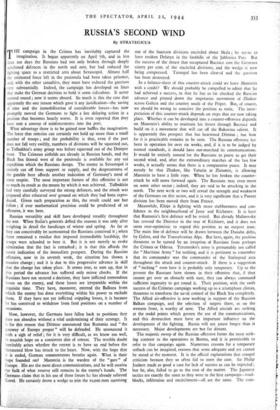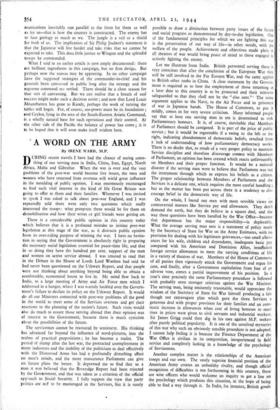RUSSIA'S SECOND WIND
By STRATEGICUS
THE campaign in the Crimea has inevitably captured the imagination. It began apparently on April 7th, and in less than ten days the Russians had not only broken through deeply echeloned defences in the north and east, but had reduced the fighting space to a restricted area about Sevastopol. Almost half the estimated force left in the peninsula had been taken prisoner, and, with the other casualties, they must have reduced the garrison very substantially. Indeed, the campaign has developed on lines that make the German decision to hold it seem ridiculous. It never seemed sound ; now it seems absurd. So much is this the case that apparently the one reason which gave it any justification—the saving of time and the immobilisation of considerable forces—has now promptly moved the Germans to fight a last delaying action in a position that becomes hourly worse. It is even reported that they have sent a convoy of reinforcements into the port.
What advantage there is to be gained now baffles the imagination. The force that rem' ains can certainly not hold up more than a small number of troops ; and the probability is that, even if the port does not fall very swiftly, numbers of divisions will be squeezed out, as Tolbukhin's army group was before squeezed out of the Dnieper front. The Crimean airfields are already in Russian hands, and the Black Sea littoral west of the peninsula is available for any sea expedition which the Russians design. The enemy in Sevastopol is entirely cut off from support or supply, and the desperateness of the gamble here affords another indication of Germany's need of some respite. The most important feature of this offensive is not so much its result as the means by which it was achieved. Tolbukhin had very carefully surveyed the strong defences, and the attack was prepared after rehearsal over ground on which they had been repro- duced. Given such preparation as this, the result could not but follow ; if ever mathematical precision could be predicated of an offensive, it was here.
Russian versatility and skill have developed steadily throughout the war. When Stalin's generals defied the seasons it was only after weighing in detail the handicaps of winter and spring. As far as they can conceivably be surmounted the Russians contrived it ; when there remained a residue that imposed irremediable hardship, the troops were schooled to bear it. But it is not merely to evoke admiration that the fact is remarked ; it is that this affords the surest indication of the immediate prospect. During the Russian offensive, now in its seventh week, the situation has shown a massive change ; and it is due to this progressive advance in skill that the change has taken place. It seems true, to sum up, that in this period the advance has suffered only minor checks. If the Russians have not secured a decision, they have inflicted tremendous losses on the enemy, and these losses are irreparable within the requisite time. They have, moreover, entered the Balkans from which the enemy has done everything within his power to exclude them. If they have not yet inflicted crippling losses, it is because he has contrived to withdraw from fatal positions on a number of occasions.
Now, however, the Germans have fallen back to positions they dare not abandon without a vital undermining of their strategy. It i; for this reason that Dittmar announced that Rumania and "the gateway of Europe proper" will be defended. He announced it with a sigh of relief ; for it is very difficult, as we know too welt, '3 nourish hope on a consistent diet of retreat. The terrible doubt inevitably arises whether the retreat is to have an end before the threatened blow has struck to the heart. Now, with the hope that it is ended, German commentators breathe again. What is their hope founded on? Manstein is the warden of the "gate" of Europe. His are the most direct communications, and he will receive the bulk of what reserve still remains in the enemy's hands. The Germans claim that in his use of these forces he has already relieved KoveL He certainly drove a wedge to join the to,000 men surviving
out of the fourteen divisions encircled about Skala ; he see us to have retaken Delatyn in the foothills of the Jablonica Pass. But the success of the thrust that recaptured Buczacz cost the Germans ninety per cent. of the encircled divisions, and the wedge is now being compressed. Tarnopol has been cleared and the garrison has been destroyed.
In a balance-sheet of this counter-attack could we leave Manstein with a credit? We should probably be compelled to admit that he had achieved a success, in that he has so far checked the Russian advance and pinned down the impetuous movement of Zhukov across Galicia and the country south of the Pripet. But, of course, we should be wrong to conceive the position as static. The inter- pretation of this counter-attack depends on steps that arc now taking place. Whether it can be developed into a counter-offensive depends on Manstein's ability to maintain his thrust through Buczacz and build on it a movement that will cut off the Bukovina salient. It is apparently this prospect that has heartened Dittmar ; but how far it is practicable remains to be seen. The Russian offensive has been in operation for over six weeks, and, if it is to be judged by normal standards, it should have out-marched its communications. It would be entirely natural for the Russians to pause to get their second wind, and, after the extraordinary marches of the last few weeks, it actually seems that there is a comparative pause. It may merely be that Zhukov, like Vatutin at Zhitomir, is allowing Manstein to have a little rope. When he has broken the counter- attack he will move forward again. The Russians may even move on some other sector ; indeed, they arc said to be attacking in the north. The next week or two will reveal the strength and weakness of the Germans on this sector, and it is very significant that a Panzer division has been moved there from France.
Meanwhile, Kleist is fighting with more stubbornness and con- fidence in the neighbourhood of Jassy and Kichenev. It is here that Rumania's first defence will be tested. But already Malinovsky has crossed the Dniester in the rear of Kichinev, and it does not seem over-optimistic to regard this position as an outpost zone. The main line of -defence will be drawn between the Danube delta, by Galatz, and the Transylvanian Alps. But here, again, the position threatens to be turned by an irruption of Russians from perhaps the Crimea or Odessa. Yeremenko's army is presumably not called the " Maritime Army " for nothing, and it is pertinent to remember that its commander was the commander of the Stalingrad area throughout the attack and counter-attack. if there is a suggestion of " inching " even here it is probably only temporary. Up to the present the Russians have shown in their offensive that, if they cannot get over an obstacle with ease, they can always command sufficient ingenuity to get round it. Their position, with the swift success of the Crimean campaign working up to a triumphant climax, threatens to transform the naval control of the Black Sea completely. The Allied air-offensive is now working in support of the Russian Balkan campaign, and the selection of targets there, as on the western front, is worthy of note. The Allied aircraft are striking at the nodal points which govern the use of the communications, and this destruction must have an important influence on the development of the fighting. Russia will not pause longer than is necessary. Major developments are trot far distant.
The majestic sweep of the Russian offensive forms the most strik- ing contrast to the operations in Burma, and it is permissible to refer to that campaign again. Numerous reasons for a temporary setback can be imagined, reasons.that seem adequate and yet cannot be stated at the moment. It is the official explanations that compel criticism because they so often fail to meet the case. Sir Philip Joubert made as good a case for lack of success as can be expected ; but he, also, failed to go to the root of the matter. The Japanese tactics are exactly the same as they were in the first campaign—road- blocks, infiltration and encirclement—all arc the same. The com- munications inevitably run parallel to the front for them as well as for us—that is how the country is constructed. The enemy has to face geology as much as we. The jungle is a veil or a shield for both of us. The implication of Sir Philip Joubert's statement is that the Japanese will live harder and take risks that we cannot be expected to take. This does little justice to Wingate and the splendid troops he commanded.
What I said in an earlier article is now amply documented: there are brilliant ingredients in this campaign, but no firm design. But perhaps now the reason may be appearing. In no other campaign have the supposed strategies of the commander-in-chief and his generals been canvassed in public long after the strategy and the supreme command are settled. There should be a close season for that sort of canvassing. But we can realise that a breath of real success might make such a decision easier ; and now that Lord Louis Mountbatten has gone to Kandy, perhaps the work of turning the tables will begin. For, of course, sea-power must be its foundation ; and Ceylon, lying in the area of the South-Eastern Asiatic Command, is a wholly natural base for such operations and their control. At the other side of the Pacific the balance of power has come ; it is to be hoped that it will soon make itself evident here.



























 Previous page
Previous page